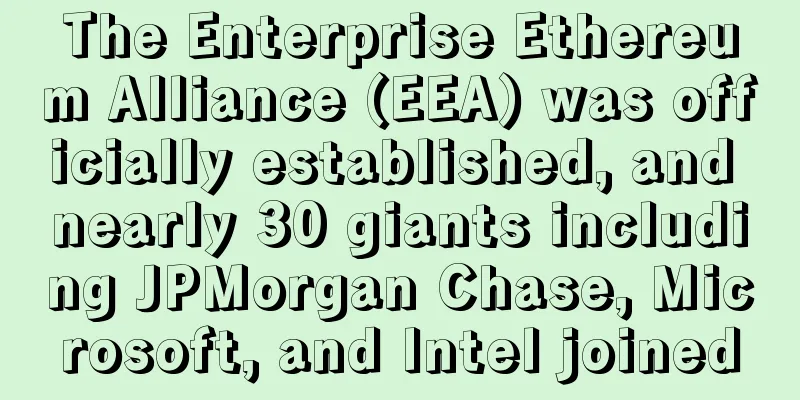The Enterprise Ethereum Alliance (EEA) was officially established, and nearly 30 giants including JPMorgan Chase, Microsoft, and Intel joined

|
JPMorgan Chase, Microsoft, Intel and more than 20 other companies have formed a new alliance, the Enterprise Ethereum Alliance (EEA), to collaborate on developing standards and technology to make it easier for companies to use the Ethereum blockchain code, ushering in an era of distributed ledger systems. According to the founding companies, the EEA will work to improve the privacy, security and scalability of the Ethereum blockchain, making it more suitable for enterprise applications. The nearly 30-strong group also includes Accenture, Spain’s Santander, BP, Credit Suisse, UBS, BBVA, BNY Mellon, Thomson Reuters and startups ConsenSys and BlockApps. The EEA is joining a growing number of joint projects by big companies that aim to use blockchain, a shared digital record of transactions that is maintained by a network of computers rather than a central authority. Companies across the board are now hoping that blockchain technology will help them streamline business processes such as the clearing and settlement of financial securities. Today, several large alliances have been established in the blockchain field, including the Financial Blockchain Alliance created by New York startup R3 CEV, whose members include about 70 international financial institutions and aim to develop blockchain technology for the financial industry. At the same time, technology giants such as IBM and Hitachi have also joined the Hyperledger project led by the Linux Foundation. The EEA highlighted the enthusiasm surrounding the emerging technology, but also the hurdles that companies still have to overcome before they can deploy it on a large scale. This includes ensuring that the technology can support the sheer volume of transactions that large companies need to process, while ensuring that its security meets their stringent security standards. Unlike R3, Hyperledger and other collaborative projects, EEA members do not currently have to pay a participation fee. Ethereum is a blockchain that can be used to deploy decentralized applications. It was invented by 23-year-old Vitalik Buterin. Several banks have adopted the Ethereum blockchain to develop and test blockchain trade applications. Alex Batlin, head of global blockchain at Bank of New York Mellon, one of the EEA board members, said that in the past few years, banks and corporate enterprises have increased their cooperation with the Ethereum development community, which has played a role in promoting the establishment of the EEA. Batlin said:
The EEA will also work with the non-profit Ethereum Foundation, the company said. |
<<: Coin Zone Trends: Bitcoin Price Trends Based on Big Data This Week (2017-03-01)
Recommend
Coin Zone Trends: Bitcoin Price Trends Based on Big Data This Week (2017-01-24)
The upward momentum is limited to the pressure ra...
How to read a man's eyes
The eyes are the windows to the soul, and differe...
Analysis of the top ten moles on a woman's forehead
Nowadays, many of our friends have moles on their ...
No matter what you do, you pay great attention to details.
People who can notice details are very unique. It...
Is it easy to get along with a woman with a crooked philtrum? What kind of personality do they have?
Nowadays, many people have very bad hearts. It is...
Moles on the back of the hand indicate good luck with noble people
There are often many manifestations of a person&#...
Moles on the soles of feet
Moles on the soles of the feet are highly regarde...
Is it good to connect the fate line after it is interrupted?
In the palms of some people, the lines may be dis...
A complete analysis of the facial features of women with good fortune in their later years
Facial features can not only reveal a person's...
What are blockchain concept stocks and what is their function?
After being mentioned constantly in various indus...
4 factors that may lead to explosive use of Bitcoin in Thailand
Thailand has the best ingredients for bitcoin suc...
What kind of man is suitable for women with oval faces to marry?
Finding a suitable marriage partner is actually a...
The founder is suspected of running away, and the Turkish crypto exchange Thodex is accused of defrauding hundreds of millions of dollars
This article is from Bloomberg, original author: ...
Ethereum ETF listing delayed
The launch of a U.S. spot Ethereum exchange-trade...
What is the fate of a woman with a mole on the corner of her eye?
Eyes are the windows to the soul, so what does a ...









